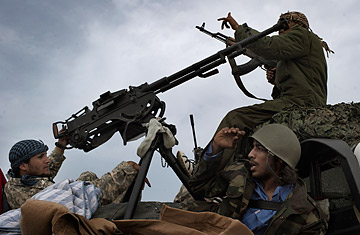
Libyan rebels retreat from Bin Jawad after Gaddafi forces pounded them with missile fire on March 29, 2011
On Wednesday, when asked why the Libyan rebels were retreating, one of their spokesmen, Colonel Ahmed Bany, said archly, "You are obviously well aware of the difference between a tank and a Kalashnikov." It could be the difference between victory and defeat.
The rebels have repeatedly emphasized their relative hopelessness in squaring off against Muammar Gaddafi's forces, using only an apparently large supply of light arms, including AK-47s, machine guns and rocket-propelled grenades. These arms are no match for Gaddafi's tanks, the rebels say. To succeed, they require large weapons to defeat the regime's tanks and Grad missiles. "Our forces have only got light weapons, and are facing military might," said Bany. "No matter how enthusiastic or courageous [the rebels may be], a handgun has no chance against [Gaddafi's forces]. Might is might, but if you don't have the military might behind it to enforce that might, then it's useless."
But what kind of armaments could the rebels use right now? Said Bany: "The types of weapons that we're seeking are the type that would be able to eliminate or destroy [Gaddafi's] military mechanization." Asked whether his forces are also in need of communications and logistical support, Bany said, "Right now we are suffering from this problem — difficulty of communications. We are trying as best we can to have communications with the components of our forces. And we are in communications with them and are able to contact them, but we are in need of more-advanced equipment."
Questioned about the presence of al-Qaeda elements in the ranks of the rebel army, Bany said, "We don't have this type of fundamentalist thinking or attitudes. So it's not on our part to be organizing any type of al-Qaeda cells within our ranks. If there are Libyans who were associated with al-Qaeda around the world previously and who are now back in Libya fighting, they are fighting as Libyans. The association with al-Qaeda is nonexistent here. They are fighting as Libyans."
Bany did, however, tie himself up in a knot by extending what he saw as the reasoning behind Gaddafi's tirades against the rebels "when he came out and said that he would ally himself with al-Qaeda in order to fight against the 17th of February revolution [the Libyan revolution] ... How is it possible that we hold in our ranks forces that would ally themselves with Gaddafi? It just doesn't make sense."
And how are the rebels supporting themselves financially? Shamsiddin Abdelmolah, a member of the rebels' national council in Benghazi, said, "The main economic assistance that we're getting right now is the marketing of Libyan oil under the name of the national transitional council. Qatar has already taken the responsibility to continue selling Libyan oil for the benefit of the Libyan people."
But the rebels still need economic aid. Said Abdelmolah: "I think the opening up of hard currency reserves — from the Libyan reserves that have been frozen — enough to be able to allow the importation of food and the like, but just for humanitarian purposes." He said the national council had already requested such action and that it was getting "a positive response regarding the release of some of that money."
